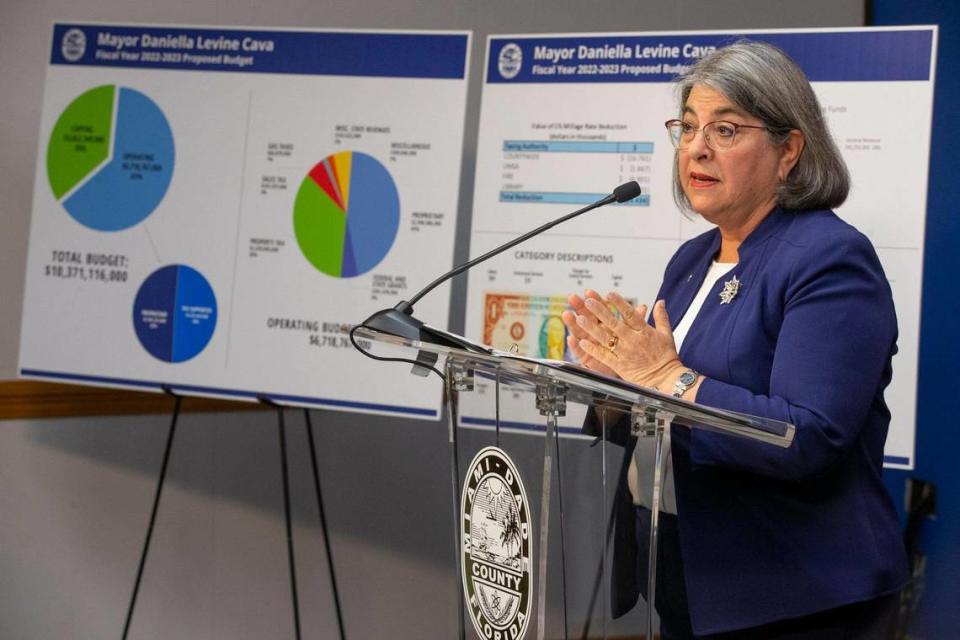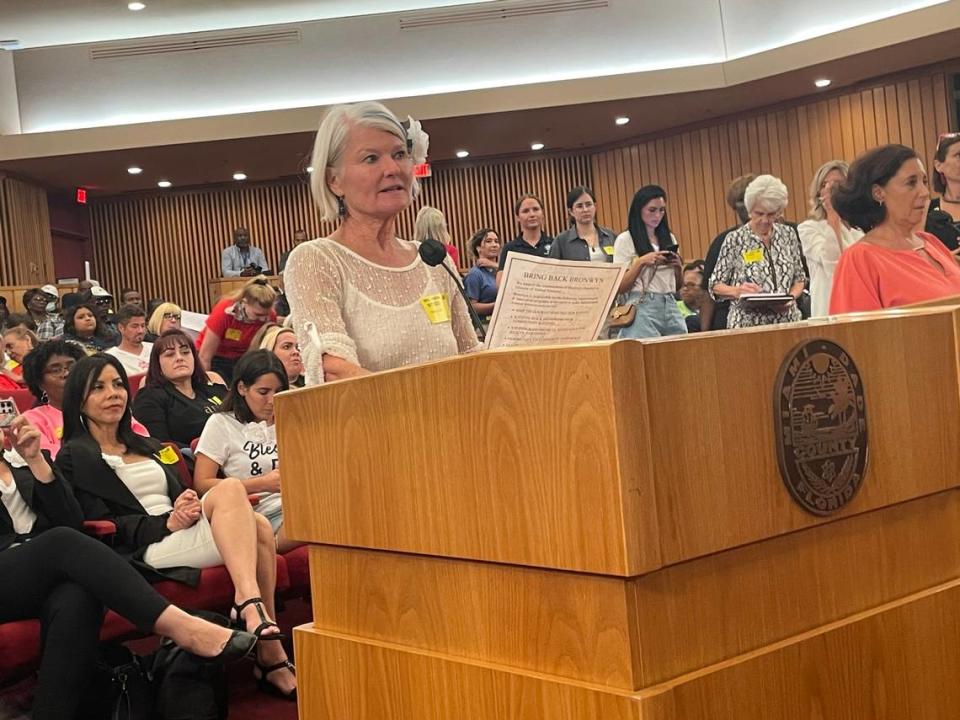Miami-Dade budget advances after pleas to fund housing, animal services and charities
- Oops!Something went wrong.Please try again later.
Miami-Dade County’s first budget over $11 billion advanced on Thursday with commissioners approving Mayor Daniella Levine Cava’s 2024 spending plan, which has a slight reduction in the main property-tax rate, higher spending and projected shortfalls in the coming years.
The $11.7 billion budget won preliminary approval through a series of votes shortly before 11 p.m. The narrowest — legislation needed to implement a $38 increase in trash fees for the budget year that begins Oct. 1 — passed 6 to 5.
Voting against were commissioners Kevin Cabrera, René Garcia, Roberto Gonzalez, Raquel Regalado and Anthony Rodriguez. Commissioners Danielle Cohen Higgins and Kionne McGhee left the chambers before that vote took place.

The budget proposal includes a 1% drop in the countywide property-tax rate, from $462 for every $100,000 of taxable value to $457. Rising real estate values helped allow Levine Cava to propose a lower rate and a 12% increase in spending, including a 3% increase in wages for most county workers.
Long-term forecasts show current revenue levels may not be enough. The property taxes charged outside city limits to fund county municipal services falls $27 million short of expenses in 2025.
READ MORE: Miami-Dade has its first $11 billion budget. Why a lower tax rate won’t cut spending
Commissioners took no action on most of the requests from about 150 public speakers who crowded the chambers at the Stephen P. Clark Center in downtown Miami and spoke for more than three hours.
Here are some of the main themes from the first budget hearing:
Housing assistance
Many speakers urged Miami-Dade to continue or expand grant programs for helping low-income residents fight evictions, pay utility bills and help with housing expenses.
“I have the saddest address on the planet,” Pedro Rafael Castro said when he took the microphone for the one minute given each person there to speak. “I’m living on the street.”
Levine Cava has about $5 million in the 2024 budget for the Emergency Rental Assistance Program, funded with a mix of county money and federal COVID dollars before it stopped taking applications at the start of 2023. Levine Cava said the money will cover about 1,800 existing applications still in the pipeline awaiting funding. Related programs offer mortgage assistance and help with utility bills.
Canvassers from Miami Workers are part of a $3 million effort to connect non-profit lawyers from Legal Services of Greater Miami with low-income tenants facing homelessness from potential evictions. Approved last year, Levine Cava’s budget proposal has an additional $300,000 for the effort.
Engage Miami, an advocacy group, used the evening to pitch a $25 million “Young People’s Budget” that included an additional $2 million for housing assistance and nearly $20 million to deal with climate-change issues, including expanding solar power and addressing flooding in low-income neighborhoods.
Multiple speakers shared their struggles living in Miami-Dade and the high cost of living that comes with it. Rosalyn LaRose spoke through a Creole translator when she described years waiting for an insurance payout on a storm-damaged roof that still leaks, and the difficulty of keeping up with a $1,000 mortgage when she can’t work. “I have arthritis,” she said. “I need assistance.”
Spending on Animal Services
Supporters of the “Pets Trust” campaign wore red, urging a $10 million infusion to non-profits to jump start sterilization of dogs and cats as Miami-Dade faces surging numbers of homeless pets overwhelming capacity at the county shelter in Doral and a bare-bones auxiliary one in Medley. “Rescue groups are bursting at the seams,” Sharon Shaw told commissioners. “If the mayor believes Miami-Dade animals are being treated well under her watch, think again.”
A smaller group of speakers in white used their time to urge Levine Cava to reinstate Bronwyn Stanford, the Animal Services director suspended in July amid a slander lawsuit accusing her of lying about a shelter benefactor. “We’ve made huge progress,” Janet Carabelli, the evening’s first speaker after arriving at County Hall at 2 p.m. “Let’s empower and do more.”
Levine Cava’s proposed $37 million budget for Animal Services is in flux.

After the mayor’s budget proposal released in July called for spending about $2.6 million creating and running a dog sanctuary in the Redland, Levine Cava last week released a memo backing away from that plan. “A third facility to house dogs would not be the most effective long-term solution to manage the large dog population and would likely reach capacity within a year,” Levine Cava wrote. Some speakers urged Levine Cava not to spend the money on the sanctuary, saying it wouldn’t provide long-term relief for the growing number of stray dogs in Miami-Dade.
Charity funding
Multiple non-profits also asked for financial help after Levine Cava’s budget wiped out the grants provided in this year’s spending plan tied to a dwindling surplus of federal COVID dollars.
The Ladies Empowerment & Action Program received $200,000 this year from the Miami-Dade Rescue Plan, a Levine Cava initiative funded with federal COVID dollars. Next year, the plan has nothing for “LEAP” and its education programs for women leaving incarceration.
“I want you know what your money bought,” Mahlia Lindquist, the non-profit’s director, told commissioners. “We have taught over 300 women in English and Spanish.”
Curley’s House, a food bank that delivers food to seniors, also lost out on a Rescue Plan grant in the 2024 budget. Founder Laverne Spicer asked commissioners for more funding in 2024 for a non-profit that can reach the county’s oldest residents. “Seniors are proud people,” she said. “They’re not going to come to their doors and talk to anyone.”
Changes sought in final version
Some of the requests could be addressed in the final version of the budget.
The final budget vote comes after a 5 p.m. public hearing on Sept. 21, and multiple commissioners said they planned on lobbying the mayor for changes in the final version her administration will release before that meeting.
“We must begin working on a comprehensive plan to address the resurfacing of our roads and stormwater management,” Commissioner Marleine Bastien said. “Whenever it rains for a couple of hours, our streets become flooded. Some of us need boats to navigate.”
Commissioner Juan Carlos Bermudez said he was concerned by the projected deficits in the $616 million budget for services in unincorporated Miami-Dade. “We need to talk about that,” he said. The budget mostly funds police patrols, a service set to transfer to an elected sheriff in 2025 once that position is revived under a state mandate.
Cabrera failed to win support from fellow commissioners for a 3% reduction in the countywide tax rate and joined Regalado and Garcia in voting against Levine Cava’s proposed 1% decrease. That followed a brief dispute over the impact of a 3% cut for a tax that funds law enforcement. “None of us are going to vote to defund the police,” Chairman Oliver Gilbert said. Cabrera responded: “It’s not defunding the police.”
Regalado urged the administration propose a targeted rebate program for homeowners. “If we want to talk about keeping people in their homes,” she said, “we should send some of that money back.”
Though he voted for Levine Cava’s tax rate, Gonzalez said he wanted to see the budget shrink to ease how much homeowners pay the county.
“Folks, when I talk to people in my community, they’re not seeing a 12% increase in services,” he said. “We cannot continue to fund government growth on the backs of the middle class.”

